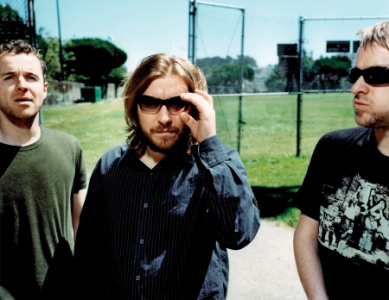1) Some Cities; 2) Black and White Town; 3) Almost Forgot Myself; 4) Snowden; 5) The Storm; 6) Walk in Fire; 7) One of These Days; 8) Someday Soon; 9) Shadows of Salford; 10) Sky Starts Falling; 11) Ambition
Less bombast, more feeling. If anyone ever felt like Doves were too studio-oriented, the band is put to focus in here. It's not about losing anything, it's switching one thing to another.
Key tracks: "Black and White Town", "Snowden", "Walk in Fire"
Doves are a band who rarely sound like one, and they’ve carved their sound out of that. They’re studio wizards - layering, fine-tuning, flicking back and forth between instruments in a way that three people simply couldn’t in a straightforward live setting (and honestly, check any live footage from the band and witness as the songs tragically cry after all the small details). On the flipside it’s meant that Doves have rarely delivered a particularly personal touch: they’re not the sort of group who’d open their hearts to the audience or expect a similar intimate reaction from the listener. They’re a band you love for the songcraft, not for any emotional resonance because there’s little of it there apart from any directly musical factor that might strike the listener.
Some Cities is - to some extent - a back to basics kind of album and through that, the established Doves foundations begin to shake up. It’s a homecoming album, lyrically and tonally inspired by the band’s return to their home city in Manchester and experiencing the mix of the old familiar and newly changed neighbourhoods. It’s also a significant baring down from the bombastic The Last Broadcast, cutting down the song lengths and their gigantic scale. Through the changes, the human element finds a way to break through. Some Cities is still a pristinely produced album that’s a studio work more than anything, but this time Doves sound like all three members could all actually be playing together in the same room. Jimi Goodwin, who’s always been a good singer with functionally decent lyrics, finds some additional resonance of his own from the material written for the album and sounds spirited. Out of Doves’ albums, Some Cities is the one that most wants to emotionally connect.

The full album doesn’t quite match what it can do at its strongest moments, but it’s fine. It still holds plenty of capital-M Moments, songs that stick and hold on their own whether it’s due to their kicking backbone or a gorgeous touch of atmospherics. It’s also an album that - for me anyway - has only gotten stronger as time has passed. The songs aren’t quite as straightforward in arrangement as they seemed like at first and the slightly lesser album moments have had a habit of suddenly creeping up with a wholly different strength out of nowhere (“One of These Days” in particular raises its hand here, going from near-filler to one of the lowkey favourites). What feels like a slight letdown at first after the grand scale of the first two albums, Some Cities ends up having a particular resonance that the other two do not have, no matter how great they are. It’s the sound of the band themselves coming through the music that gives the album that additional spirit: the notion that for the first time, the songs sound personal to them. If the entire record was as consistently high-mark as Lost Souls, this could even have been Doves’ best.
Final anecdote: until I got to listen to the album during the gray Manchester winter, I didn’t realise just how perfectly the band captured something essential about their contextual environment. I’m really not sure if this was ever intentional, but they really nailed the right atmosphere down - to an extent that I might even argue I understand the album a little better for it.

No comments:
Post a Comment